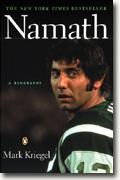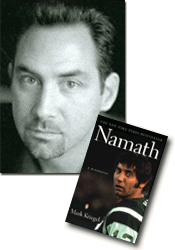An
Interview with
Mark Kriegel
Interviewer Ram
Subramanian:The hardcover edition of this book was published in 2004. Namath reached his athletic peak in the 1960s. What was your motivation in writing about him?
Mark Kriegel:In 2001, I heard a story about Namath trying to cope with his life as a newly divorced dad. It wasn’t the destination anyone would have envisioned for a man who had once been America’s most famous bachelor. But in a peculiar way, I found his pain and his concern for his kids to be as ennobling as anything he had done on the football field. I grew up in New York and Namath was the first ballplayer I remember idolizing. His career anticipates a lot of the stuff I would learn about later as sportswriter working in the age of Michael Jordan. Actually, I’m not sure there would have been an Air Jordan (not to confuse the persona with the man) if there hadn’t been a Broadway Joe first. The whole concept of a ballplayer as a television celebrity begins with Namath. He was a spectacular talent, heroic on the field. He could move merchandise. And he did great ratings. But it was the image of the struggling erstwhile hero, now on the other side of the millennium, that first gave me the idea for the book.
In the book (in the “Acknowledgments” section) you indicate that Namath chose not to cooperate. And yet, the book does a fine job of providing a fairly balanced narrative of Namath’s life. What could Namath have added?
Namath has been famous for a long time. There’s a fairly comprehensive record of what he did and what he said. I combined what was already known with a lot of interviews and a variety of other source materials (beginning with the documents from his grandfather’s arrival at Ellis Island) to make Namath as real as I could. I think I got close to the core of the man and what he meant, particularly to guys of a certain age. As for what Namath himself might have added, that would depend on how deep he was willing to delve into his own life. I’m not so sure he’d be willing to do that. He doesn’t volunteer intimacies for public consumption. That’s not his style.
As many reviewers have pointed out, the book offers a wonderful social commentary of the milieu and times that Namath played in. Was it a conscious choice of yours?
I always thought of Namath in the context of his times. His story runs through some awfully interesting places. In Beaver Falls, Pa., he learns what life in a steel mill can do to a man. At the University of Alabama, he watches as Governor George Wallace attempts to prevent the enrollment of black students by infamously standing in the schoolhouse door. In New York, Namath all but presides over a sea change in the town’s nightlife, from old-fashioned watering holes to singles joints. What’s more, his fortunes are tethered to that device connecting all baby boomers. That would be television.
 In many instances in the book, you take on a wry tone of an observer who sees the humor and irony in the situation. For example, in describing the action in a key game, you write about Namath considering the advice of a cab driver. At other times, your wry tone relates to people and their actions. Once again, was it a deliberate choice on your part?
In many instances in the book, you take on a wry tone of an observer who sees the humor and irony in the situation. For example, in describing the action in a key game, you write about Namath considering the advice of a cab driver. At other times, your wry tone relates to people and their actions. Once again, was it a deliberate choice on your part?
In places, the tone of the narrative is determined by the situation and the point of view. I wanted the reader to see Namath as he was seen by different people: the bartender, the rookie cop, the college sweetheart, the old pal who listens to the Super Bowl on Armed Forces radio in Vietnam.
Both Namath and Mickey Mantle played in the media pressure cooker of New York. Both drank and womanized and stayed out late every night. Mantle rationalized his escapades by saying that he did not expect to live very long. Namath feared for his knees. Both found life after athletics difficult. Was that a pattern of top athletes in big cities in the 1960s and 1970s?
I don’t think there is any pattern at work here, but there’s a great deal connecting Mantle and Namath. They each had their outrageous athletic gifts compromised by bad knees. They drank because they liked to drink, but also, because they came to count on alcohol’s analgesic properties. Booze alleviated pain, both physical and emotional.
The book is remarkable in the amount of research that you had done to recreate a bygone era so vividly. How did you approach such a mammoth task?
I was scared enough to work as hard as I could.
What are your future writing plans? Are you working on a book currently?
I’m writing a book about basketball legend Pete Maravich, and his father, Press, one of the more interesting coaches the sport has ever known. Together, father and son created their game’s version of Elvis.
Contributing reviewer Ram
Subramanian
conducted his interview with Mark Kriegel via email for curledup.com.
Click here to read his review of Namath: A Biography.


